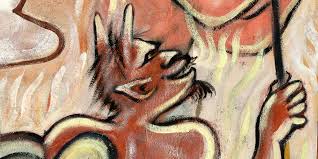Palm Sunday
Many years ago, when I was in college, I had a classmate named Jim who distinguished himself as one of the most intellectually gifted persons I ever knew. After completing college, he went on to graduate school to study philosophy in Washington, DC. And then I lost track of him.
Until I got the news.
Jim’s body was found floating in the Potomac River. All of us who knew him were shocked. His professor said he was the brightest student he had ever known.
What happened?
A friend of mine who went to school with him in Washington told me that, in cleaning out his room, he was stunned by the fact that he kept finding notes written in Jim’s handwriting with the same message – a message with two questions: Who is this God? What is it that He wants?
Let’s start with the first: Who is this God?
Palm Sunday presents us with a very unusual version of a deity. In the words of St. Paul in our second reading, he’s a God who “emptied himself, taking the form of a slave” – the form of the lowest element of society, a slave.
Palm Sunday attempts to answer this question of who our God is by establishing from the beginning that the God of Jesus is like no other. He is unique in all human history.
Notice, for example, that as Jesus enters Jerusalem there are no trumpets blaring, no resplendent carriages proudly acclaiming royalty, no horses bedecked with finery of any kind – nothing that demonstrates power or majesty.
Then remember what Paul told us in today’s second reading: He’s a God who “emptied” himself.
And so, the God that Jesus presents as his Father, sits on a donkey. This same God who marches into Jerusalem knows that His “coronation” ceremony will be one of whips and lashes. His royal “throne” will be a cross. His “glory” will be His death.
Why does Jesus do this? Because that is the kind of God Jesus preaches and imitates.
The whole reason Jesus humbly and willingly embraces all of this is for one purpose: to demonstrate visibly that God is the One who completely identifies with and enters the experience of the people with whom He is madly in love.
Our God, in other words, is One who is sending a message through Jesus in this Palm Sunday celebration that He wants everyone to hear with utter clarity: “nothing human is abhorrent to me.” All of life – even the most horrible kind of suffering, even death – is something so precious that God wants to be in solidarity with it. He wants to embrace it and transform it.
That’s who our God is.
So, what is it that this same God wants from us?
To put it simply, Jesus wants us to die with Him. Only the death he’s talking about for us is not the one that awaits all of us when our earthly time is over. The death our God is interested in is the death of our egos. He wants us to die to that part of us that wishes to enthrone our own selves, that part of us that dreams of being adored, worshiped, acclaimed, glorified.
God wants us to “die before we die,” as Fr. Richard Rohr so aptly puts it in many of his writings.
So, again: Who is our God? What is it that He wants?
The lessons of Palm Sunday give us the answers to both questions.
Perhaps the apostle Paul sums it up as well as anyone could:
“Christ Jesus, though he was in the form of God, did not regard equality with God something to be grasped. Rather, he emptied himself, taking the form of a slave ….”
Our God wants us to become like Him: the God who “emptied himself;” the God who sat on a donkey.
Ted Wolgamot, Psy.D.
11809194.1 4/8/2017



